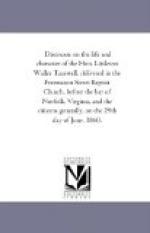His position gave him decided advantages of observation and improvement. His father, who was a prominent politician, and long a judge of the General Court, was now a judge of the Court of Appeals, and was soon elected to the Senate of the United States. In his society he saw Pendleton, Carrington, Roane, Fleming, and Lyons, who composed the Court of Appeals at that day, and all of whom I heard him recall in living colors a few months before his death. It was the custom of the judges of the Court of Appeals to put up at the Swan, where they might easily consult with Pendleton, their chief, whose injured limb prevented him for the last thirty years of his life from going abroad. It was at the Swan the judges kept their black cloth suits during the recess of the courts; for in those days there were no public conveyances; and all the judges, except Pendleton, who drove into Richmond from Caroline in a slow lumbering vehicle, nicknamed, after the wild driver of the coursers of the sun, a Phaeton, came into town on horseback, and were often clad in the cloth of their own looms. I mention these details of the early times of Mr. Tazewell, as they may serve to explain that stern simplicity of manners, of taste, and of general living, to which he resolutely adhered through life. Although fond of agriculture, and the owner of large landed estates, as he did not reside on them he did not require vehicles for the use of his family; and, at his residence in Norfolk, I think I may say that, for the last forty years at least, he never kept a carriage above the dignity of a gig, and I have doubts whether during that time he even kept a gig. The last time I saw him riding, some ten or twelve years ago, he was on horseback, accompanied by his son. I well remember when to take a drive in a carriage, or to use an umbrella, was deemed effeminate by some of the wealthiest planters in Virginia.
It was on the 14th day of May, 1796, that he received his license to practice law. The license, written in a bold hand on paper, was signed by judges Peter Lyons, Edmund Winston, and Joseph Jones, and is preserved by his children as a family relic. His first fee was derived from a warrant trying, in which a Mr. Taliaferro, who was his landlord, was a party, and was fifteen shillings, which helped to pay the rent of his office. His first important criminal case was the defence of a man on a charge of murder. Whether his client was innocent or guilty, I know not; but Tazewell got him clear of the law; and the man was so thankful for his services, that half a century afterwards he confessed his gratitude to a daughter of Mr. Tazewell, whom he chanced to see in the streets of a neighboring town.




